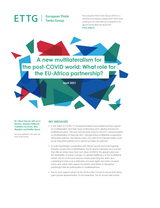
A new multilateralism for the post-COVID world: What role for the EU-Africa partnership?
Teevan, Chloe / Luca Barana / Daniele Fattibene / Gabriela Iacobuta / Silke Weinlich / Steffen BauerExternal Publications (2021)
Brussels: European Think Tanks Group (April 2021)
Multilateralism has been in trouble for a while, particularly at the global level. Yet, the European Union (EU) and its member states have remained among its staunchest supporters. In their June 2019 Council Conclusions, EU leaders drew the outlines of a common European vision to uphold, extend and reform the multilateral system. Against an increasingly complex and contested geopolitical backdrop, these goals were further developed in the recent EU Communication on Multilateralism, published in February 2021.
Key messages:
• In the wake of COVID-19, European leaders have reaffirmed their support for multilateralism and their hope of reforming and carrying forward the multilateral system. This was most recently stated in the EU’s Communication on Multilateralism of February 2021. Strengthening multilateral cooperation will require partners. The African Union (AU) with its 55 member states could be an important partner, but it cannot be taken for granted.
• To build meaningful cooperation with African actors and work together towards constructive multilateralism, the EU and its members must accept that African states have their own views of shifts in the global order and the desirability of further change. For greater legitimacy of the multilateral system, the EU must move beyond simply protecting the status quo, combining its stance as a defender of human rights and other universal norms and values with support for reforms and efforts to strengthen meaningful African participation in multilateral fora.
• The EU must support reform of the UN Security Council to ensure that Africa gains proper representation. In the meantime, the EU should take further steps towards substantive cooperation. This includes improving internal coordination; increasing outreach to the A3, the AU and concerned African states; and working with the A3 early in the drafting process for resolutions that affect Africa.
• The EU should make the most of the G20 Italian Presidency in 2021 to facilitate participation of African actors in this forum, which has increasing sway over a range of sensitive issues for African countries, such as debt relief. The G20 should seek to build consensus around an inclusive recovery agenda, to “build back better” and advance structural cooperation in the financial and health sectors.
• COVID-19 has demonstrated the importance of health as an urgent area of multilateral cooperation. The EU should seek to work closely with African actors to reform and improve multilateral structures in the health domain, to respond effectively to the ongoing crisis and for future preparedness. This should include supporting African countries in developing local bio manufacturing capabilities, working together to reform and strengthen the World Health Organization (WHO) and to fully implement the “One Health” approach.
• The EU should engage with African countries now to formulate a common and mutually beneficial vision and position for the international climate and environmental negotiations set for this year. Particularly, this concerns decisions on the post-2020 biodiversity framework and post-2025 climate finance target and reporting standards. Key topics include the role of nature-based solutions in addressing and integrating multiple environmental issues and provision of more funds for climate adaptation.



